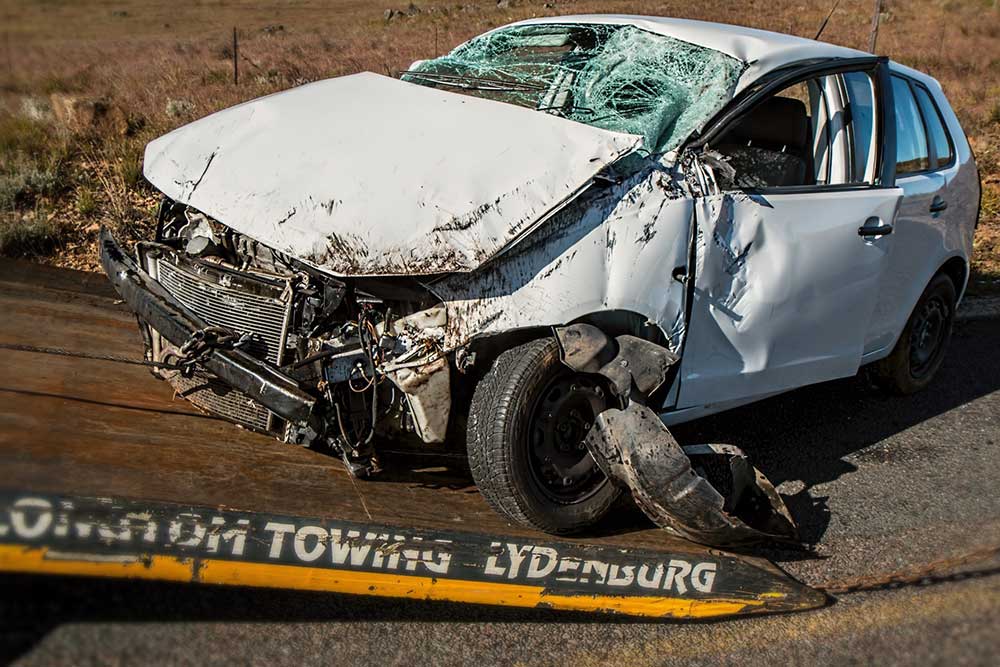
After a car accident, you will have to deal with insurers sooner or later. And the things you say to them can negatively impact your claim. In this article, we share what to avoid during negotiations with an insurance company and how to act confidently and secure fair compensation.
Why Your Words Matter After a Car Accident
Insurers can use your words to reduce payout amounts. This applies to both your own insurance company (while on your side, it still represents a business) and the adjusters from the other driver’s insurance company. They can twist even seemingly innocent phrases in their favor:
| What You Say | How It Can Be Interpreted |
|---|---|
| “I’m sorry this happened.” | Admission of responsibility |
| “I didn’t see the other car.” | Negligent driving behavior |
| “I feel fine right now.” | No injuries occurred in the accident |
Should You Call Your Insurance Company Right Away?
Yes, call your insurer promptly, as this is actually what the insurance policy typically requires after an accident. This ensures your damage is properly documented and speeds up repairs and medical coverage.
In most cases, you can initiate a claim without having to provide a detailed story or give a recorded statement immediately. You can tell an insurance company you’re not ready and wait to make the call when you have all the facts, obtained a police report and medical records, or have spoken with a lawyer.
When to Avoid Talking to the Other Driver’s Insurance Company
While you’re not obligated to talk with the other driver’s insurance company at all (unless you’re making a car accident claim with them), it’s safest to steer completely clear of third-party adjusters in the following situations:
- You’re still in shock or feel pressured.
- You haven’t spoken with your own insurance company yet.
- Significant injuries or substantial property damage are involved.
- They ask you to record your statement.
- They request access to your broader medical records.
- Your claim is represented by a lawyer (all contact should go through them).
What to Say When Your Own Insurance Company Calls?
When you talk to your insurance company for the first time, the main goal is to file a personal injury claim and get its number. You can begin with the essentials: when, where, who, and any visible damage. Stay cooperative, but avoid giving lengthy explanations while you’re still processing the incident.
How to Speak to an Insurance Adjuster
Whether you communicate with your own insurance adjuster or the other party’s insurance company, you should be able to protect your interests. The tips below will help you communicate clearly and with confidence.
Be Prepared Before the Call
Before the call with an insurance company, gather the following:
- Police report number and the investigating officer’s name
- Photos of vehicle damage, the accident scene, and any injuries
- A written timeline explaining what happened
- Notes about weather, traffic signals, and road conditions
- Contact information for all drivers and witnesses
- Medical records and bills (if you’ve received treatment).
Stick to the Facts
Share only facts, avoiding assumptions, as this may hurt your credibility if later evidence contradicts your statements. Here are some examples of safe, factual statements:
- “I entered the intersection when the light was green.”
- “I called 911 right after the crash.”
- “The officer who came to the scene was [name], badge [number].”
- “It was raining when the accident happened.”
Avoid Sharing Personal Opinions
It’s the insurers’ and the police’s job to determine who was responsible based on the investigation and evidence collected. Although adjusters might ask questions like, “What do you believe caused the crash?” or “How fast do you think the other driver was going?”, it’s best not to guess and only mention clear facts.
Here are some common risky phrases to avoid:
- “I think the other driver was texting.”
- “The driver seemed drunk.”
- “I assume they didn’t see the stop sign.”
- “I probably could have avoided this if…”
If you want to point out the other driver’s obvious mistakes, you can put it this way:
- “I smelled alcohol on the driver’s breath.”
- “I saw the driver holding a phone and looking down just before the collision.”
- “A witness named [name/contact] reported the same.”
- “I have photos/dashcam video.”
Basic Facts You Can Share Safely
There are some facts you can and must share to move your personal injury claim forward:
-
Time and place
“The collision occurred on [date] at [location].”
-
People and cars
“Parties involved were [names], plates [numbers], vehicles [make/model].”
-
Police
“Report number is [#]” or “Report is pending.”
-
Damage and injuries
“Visible damage to [areas]. I’m getting a medical evaluation and will update when I have the records.”
Statements That Can Harm Your Claim
When talking to your or the other party’s insurance company, it’s vital to avoid saying things like these:
“It Was My Fault”
Fault is a puzzle that often involves pieces that might not be obvious to you immediately: road conditions, vehicle mechanical issues, intersection design, and more. But admitting fault can become part of the official record, which might be difficult to change later.
“I Feel Fine”
Minutes after the crash, your body can mask injuries, and the first thought might be that everything is okay. Yet, sometimes, injuries can appear hours or even days later. Thus, it’s best to tell the insurance adjuster that you haven’t gotten a full medical examination yet.
“I Think…”
When you say, “I think the other driver was speeding,” it’s perceived as your personal opinion rather than a solid fact. This can make you seem unsure and might give the insurance adjuster a reason to doubt what you saw. It’s better to be more straightforward when describing what happened.
“I Accept Your Offer”
If you accept an initial offer, you can’t go back for fair payment later. The goal of such speedy offers is to minimize a payout before you even realize the full costs — medical bills, lost wages, and pain and suffering.
Why You Shouldn’t Admit Fault
Even in situations where you think you might be partially responsible, it’s usually better not to accept liability right away. Massachusetts follows the comparative negligence rule, which means blame can be shared among parties.
Thus, even if you made a small mistake, the other driver might still be found mostly responsible. You can get compensation as long as you share only partial fault of no more than 50%. But if you admit to being liable, you risk losing this chance.
Avoid Discussing Your Injuries Too Soon
Symptoms from a crash can take hours, even days, to surface. If you say at the scene that you feel “fine,” it may close the door to including these injuries in your personal injury claim later.
Why You Should Decline a Recorded Statement
A recorded statement becomes permanent evidence that the insurance company can use against you. Adjusters are trained to ask questions that might seem harmless but are designed to make you admit liability or say something else that can hurt your claim. Once your words are recorded, you can’t just take them back.
Common Questions an Insurance Company Asks
When an insurance company starts its interviews, it often relies on open-ended questions meant to prompt car accident victims to explain their accident in their own words. You should be prepared for such questions to respond thoughtfully, ensuring your answers only support your personal injury claim.
“Can You Describe What Happened?”
Your adjusters and the other insurance company may want you to reveal more than necessary. By asking this question, they might be seeking admissions of fault, speed estimates, or any other statements that can then work against you.
“What Is the Extent of Your Injuries?”
This question can come too early, when you can’t possibly know the full extent of your injuries. Adjusters can use it to downplay your injuries so that you can’t file for future medical help if you need it.
“Can We Record Your Statement?”
Adjusters often ask if they can record your statement, telling you it’s just part of their standard claims process. Yet, it’s optional, so you don’t have to agree — in fact, it’s better to deny this request.
How to Document Conversations with Insurers
Insurance adjusters often manage dozens of cases at once, which means details can sometimes get mixed up or forgotten. That’s why it’s smart to keep a detailed record of every conversation you have with your insurance company.
Here’s what you should keep track of:
- Adjuster’s name, company, and phone number
- Date and time of each call or meeting
- Questions they asked and your responses
- Any promises made about your car accident claim
- Compensation amounts mentioned.
Social Media Mistakes to Avoid After a Crash
What you post on social media after a car accident can be used against you, just like your words. Insurance companies often look through social media profiles of claimants to find any inconsistencies. To avoid any extra problems while you seek compensation, try not to post:
- Photos of yourself doing sports or partying
- Pictures of vehicle damage or the crash scene
- Updates about your physical activities or upcoming trips
- Anything that mentions the accident, even indirectly.
When to Let a Car Accident Attorney Handle Communications
A DIY claim can work for some car accident cases, but when the situation gets complicated or the stakes are high, it’s best to let a professional handle your insurance claim. An experienced attorney can step between you and the insurance companies to keep your interests safe. Here are the most common scenarios when you should consider hiring a Boston car accident lawyer:
- You need surgery or long-term treatment for serious injuries, or you can’t work due to them.
- The accident involved multiple vehicles and victims.
- The driver at fault has no or low insurance coverage.
- You received an insurance claim denial notice.
- The insurance company is using delay tactics to extend the settlement timeline and pressure you into accepting lower offers.
- You’re uncomfortable negotiating with adjusters.
- The crash involved a commercial vehicle or a rideshare driver.

Get a Free Case Evaluation
How an Attorney Can Negotiate a Fair Settlement
A good car accident lawyer brings a lot to the table during settlement negotiations. Here’s how legal representation can help you get what you deserve:
- Their experience lets them detect low offers right away. They know what personal injury victims with similar injuries and circumstances in your area receive and how to put you in the strongest position possible.
- Insurance companies realize that your lawyer can take legal action if needed, which often encourages them to make a fairer settlement offer.
- Settlement negotiations involve tedious paperwork and strict deadlines. The job of a personal injury attorney is to ensure nothing is overlooked.
Free Case Review: What to Expect
Reliable law firms like Michael Kelly Injury Lawyers offer free consultations to review your claim. During this meeting, they’ll go over the basic details of the accident, assess how strong your claim is, and determine how much compensation you might be entitled to.
After the consultation, you’ll get honest feedback about whether you need a lawyer. Plus, you can reach out to an attorney who works on a contingency fee basis, which means they only get paid for their legal representation if they manage to recover compensation for you.
Protect Your Rights and Seek Legal Help Today
Every statement you make after an accident can potentially affect your compensation. But you don’t have to stress about constantly second-guessing what you say in the claims process. In fact, you might not even need to talk to the insurance companies at all.
Entrust your claim to the experts at Michael Kelly Injury Lawyers. Our law firm is here to handle the legal side of your car accident, aiming to get the best settlement or verdict for your injuries and damages. Reach out for a free consultation to discuss your car accident case today!
Final Tips to Handle Insurance Calls Confidently
Here are some tips to help you keep control over your conversations with an insurance company:
- Keep your answers short, clear, and straight to the point.
- Don’t feel like you have to fill every silent moment with extra details.
- Politely end a conversation if you start to feel overwhelmed or pressured.
- Write down everything: names, dates, and the main points discussed.
Lastly, consider having a lawyer handle all communications for you.






